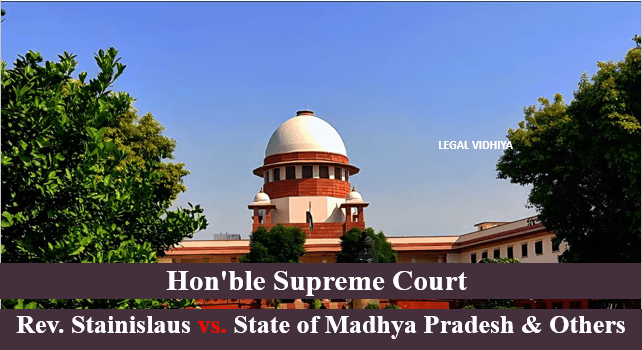
Rev. Stainislaus vs. State of Madhya Pradesh & Others
| Citation | 1977 AIR 908 1977 SCR (2) 611 1977 SCC (1) 677 |
| Date of Judgement | 17/01/1977 |
| Court | Supreme Court Of India |
| Case Type | Civil Original Jurisdiction |
| Petitioners | REV. STAINISLAUS |
| Respondent | STATE OF MADHYA PRADESH & ORS. |
| Bench | RAY, A.N. (CJ) BEG,M. HAMEEDULLAH SARKARIA,RANJIT SINGH SHINGAL,P.N. SINGH,JASWANT |
| Referred | Article 25, Article 25(1), Article 26 |
FACTS OF THE CASE:
Rev. Stainislaus, the appellant, was sanctioned for prosecution by the Sub-Divisional Magistrate of Baloda-Bazar for committing offenses under Sections 3, 4, and 5(2) of the Madhya Pradesh Act, which in broader respect is the allegation of unlawful or forceful conversion from one religion to the other.
The appellant, Rev. Stainislaus, raised his main objection when the case was heard by Magistrate, First-Class, Baloda-Bazar, claiming that the State Legislature lacked the necessary legislative authority and only the Parliament had the authority to make laws and not the state legislature. He also contended that the Madhya Pradesh Act violated the Constitution because it did not fall under the authority of Entry I of List II and List III of the Seventh Schedule. It was also further raised that Sections 3, 4, and 5(2) were in violation of Article 25 of the Constitution and hence were void. The Magistrate did not refer the matter to the High Court with the view that the objections raised had no force in them. The same view was held by the Additional Session Judge when asked for the revision of the order. Hence, the appellant moved to the High Court and filed petitions.
Therfeore, the case mainly dealt with the validity of Madhya Pradesh Dharma Swatantraya Adhiniyam,1968 and Orissa Freedom of Religion Act, 1967, challenged in the High Court of Madhya Pradesh and the High Court of Orissa respectively.
ISSUES:
- Whether the two Acts were in violation of the Article 25 of the Indian Constitution.
- Whether the State Legislatures were competent to enact these Acts.
ARGUMENTS:
The main argument from the petitioner’s side was that sections 3, 4, and 5(2) of the Madhya Pradesh Act, which deals with the prohibition of unlawful conversion of religion and punishments, respectively, were in violation of Article 25 of the Indian Constitution, which guarantees freedom of conscience and free profession, practice and propagation of religion and therefore was void.
Another objection that was raised is that the State did not have any authority to establish the act. The act was ultra vires the Constitution since it did not fall within the ambit of Entry I of List II and III of the Seventh Schedule. It was contended that only the Parliament had the power to enact and make the law.
Regarding the second issue, it was argued that the legislature of Madhya Pradesh and Orissa States did not have the authority and competence to pass the Acts since their laws fall under the Residuary Entry 97 in List 1 of the Seventh Schedule to the Constitution, which deals with regulating religion.
JUDGEMENTS:
The High Court, in view of the contentions made, held that the Madhya Pradesh Act and the Madhya Pradesh Swatantraya Rules, 1969were only enacted to penalize and prevent unlawful conversion of religion by force, fraud, or allurement and, therefore, cannot be said to be in violation of Article 25(1) of the constitution of India. The court stated that the Act upholds equality and freedom to all; the court added that particular sections 3, 4, and 5(2) of the Madhya Pradesh Act established equality and religious freedom for all by prohibiting unlawful conversion of religion. The Court clarified that Article 25(1) of the Constitution does not guarantee a person’s right to convert one’s religion to their own religion but establishes the right to spread the tenant of one’s religion but with due restrictions.
While dealing with the second issue at hand, the Court held that the provisions made in The Madhya Pradesh Act only provide for the maintenance of public order by ensuring to prevent forceful or unlawful religious conversion. Without it, the court added there would only be public disorder. Reference was also drawn to the case of Ramjilal Modi v. State of U.P., where it was held that the rights guaranteed under Article 25 and Article 26 were relevant to the public order. Another case referred was the Arun Ghosh v State of West Bengal, where it was decided that if something disrupts not only an individual but the current life of the community, then it is a public disorder.
Therefore to conclude, If an attempt is made to incite communal feelings on the grounds that someone has been “forcibly” converted to another religion, it will almost certainly lead to fears of a breach of public order, affecting the entire community. The challenged Acts thus fall within the purview of Entry I of List II of the Seventh Schedule, as they are intended to avoid disruptions to public order by prohibiting conversion from one religion to another in a manner repugnant to the community’s conscience. The two Acts do not regulate religion, and there is no justification for the claim that they fall under Entry 97 of List I of the Seventh Schedule.
REFERENCES:
https://main.sci.gov.in/jonew/judis/5403.pdf.
https://indiankanoon.org/doc/1308071/.
https://blog.ipleaders.in/an-analysis-of-the-madhya-pradesh-freedom-of-religion-act-2021/.
This article is written by Sanjana Ramesh of Himachal Pradesh National Law University Shimla, an intern at Legal Vidhiya.




0 Comments